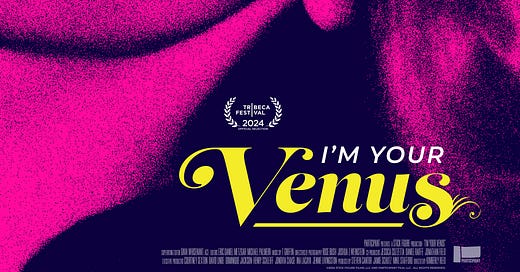I’m Your Venus, not your tragedy
Ancestral veneration through I’m Your Venus, now streaming on Netflix.
Last weekend, I’m Your Venus, the 2024 documentary chronicling the unsolved murder of one of Paris is Burning’s star subjects, Venus Pellagatti Xtravaganza, made its way to silver screens for a limited-time viewing in Brooklyn at Prospect Park’s Nitehawk Cinema ahead of its Netflix release today.
It marked sixteen years since my last visit to the venue, once called the Pavilion, for the opening of Twilight: New Moon. This was several years before I would lay eyes on Venus and the likes of Octavia St. Laurent in Paris is Burning, years before I would embark on my transition through the journey of self and gender like those women who paved a path in the New York City concrete for generations of fem queens to come.
I attended the screening with a friend. As I tucked my tote in a nook between the seats, we placed an order. The lights began to dim in the theatre, and I wondered if I was the only person questioning how much of this moment we owed to the life Venus never got to live. Over the course of a two-hour film, the director and producers (many of whom currently hold leadership positions in the ballroom scene both Venus and I once participated in) answered just that, while shining a light on the past as a guide to the future.
The film follows Venus’ family, both chosen and biological, through the process of posthumously changing her name, getting the home she shared with her grandma in Jersey City designated as a national landmark, and potentially uncovering details of her unsolved murder.
During a political era that feels eerily similar to the one that allowed the murders of women, queer, and colored people alike to go overlooked, producers and descendants of the Paris is Burning girls, including Dominique Jackson (of the ballroom house of Maison Margiela and Pose FX), Jonovia Chase (of the ballroom house of Lanvin), and subjects of the film like Michael Roberson (Maison Margiela) and Gisele Xtravaganza, brought their powers together for the sake of not only ancestral veneration but to symbolically hold a door open for the children of the future.
Arguably, this was able to be communicated so beautifully through film because this practice is native to ballroom culture: the cultivation of leaders while young, who go on to shape and curate space for those who come after them through tradition and commemoration. Except this time, it’s not done through a competition category in the name of an icon or legend passed, but through recollection and memorialization.
When the film opens with one of the Pellagatti brothers at a Jersey City intersection, where he had, for the first time, seen Venus in full regalia, comedically recounting the story of his zany, beautiful sister, we’re shown the power of beauty through resistance. And moments later, when he takes his son to visit the street where his aunt lived when she dutifully cared for him as an infant, we’re shown the power of veneration through legacy.
The frank and unabashed Italian nature of her brothers, as they share anecdotes and wrestle with the reality of how their past actions once affected their sister, becomes a series of tension-breaking moments that spark laughter and tears among moviegoers. Moments like those, while wholesomely painting a fuller image of Venus’ world outside of Paris is Burning, also hold a bitter mirror to the present.
Anti-queer youth legislation prohibits medical access to girls like her, making the stifling environment that eventually took her life even more relevant, even more current. A world where beauty and queer joy are hidden beneath eye-level. This is illustrated even in the title cards, designed to transition from a bold white to a bubbly pink.
What I enjoyed the most were re-edited clips from Paris is Burning of Venus, mundanely cleaning her grandmother’s kitchen, where she stayed in an airy white pajama set, pink jumbo hair rollers haphazardly strewn across her head. To us, an icon gone too soon, but in reality, just a girl who said yes to a calling she was denied on all fronts.
In the end, I’m Your Venus does not offer a resolution, just as I wasn’t offered one when I left the theatre to news of the US’ involvement in a nuclear site bombing in Iran while the legality of my chosen identity remains hung in a court of law. It doesn’t solve Venus’s murder or untangle the violence that took her. But it does what the best stories do: it remembers. It recalls her dreams, her softness, her stubbornness. And in doing so, it makes space for her, for us, for the girls yet to come. Girls who should’ve had more time.




Thank you for sharing! It’s promted me to go find and watch! ❤️🌟🌸